Graduation Time: Exciting, Free Recitals
It is time to head to the San Francisco Conservatory of Music. A map is provided to assist you in the quest.
As students strut their stuff in individual and group graduation concerts, they — and their families — bask in the spotlight. At the same time, music lovers get a chance to hear free concerts and discover stars of the future for themselves.
Last week, Music News presented the case for oboist Sydne-Mychal Sullivan's recital at 8 p.m. on April 29. Now, having pulled teeth from some of the young virtuosi, who have great skills except in publicity and marketing (they'll learn!), here are a few other recommendations:
Bassoonist Justin Takamine, 11 a.m. on April 15
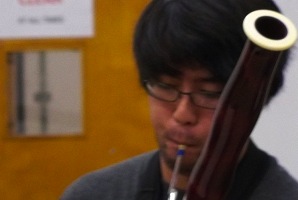
In his first year studying with Steve Paulson at SFCM, Takamine is working for a master's degree. His B.A. is from UCLA, where he studied with John Steinmetz.
His minor was in mathematics, and Takamine admits enjoying "the extremely nerdy pastime of computer programming," cashing in on the hobby by working as application developer at a software company.
"School and work keep both sides of my brain happy and, surprisingly, I often find in one insight into the other."
Accompanied by Xiyan Wang, Takamine will perform works by Noel-Gallon, Devienne, and Saint-Saëns.
Mezzo Kate Allen, 8 p.m. on April 20
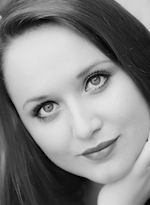
Irish-born Allen is one of S.F. Conservatory master teacher César Ulloa's many talented voice students.
She is in a postgraduate program, on a Phyllis C. Wattis Foundation scholarship, having completed her Master of Music degree in San Francisco.
Allen won the 2010 San Francisco district title of the Metropolitan Opera National Council Auditions.
Her program includes arias by Handel, Cilea, and Bellini; songs by Dvorak, Tchaikovsky, and Mahler.
Soprano Maya Kherani, 5 p.m. on April 22
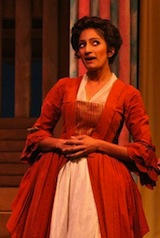
With a Bachelor's of Science degree, summa cum laude no less, from Princeton University in mechanical engineering, as well as minors in materials science, robotics, and intelligent systems, Kherani is aspiring to a singing career.
Locally, she already made her mark in the San Francisco Conservatory's Cosi fan tutte and Ensemble Paralèlle's Four Saints in Three Acts.
She is studying with Pamela Fry in vocal performance master program.
Her recital will include arias by Vivaldi, Purcell, Dominick Argento, Mohammed Fairouz, Bizet, and Richard Strauss.
Pianist Laure Struber, 5 p.m. on April 28
French-born Struber has an unusual resume including a Fulbright scholarship, martial arts, and at age 24, two decades of piano.
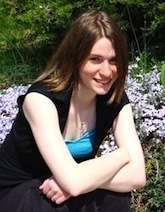
She also plays harpsichord, fortepiano, and "some minuets on the viola."
Struber is working on her master's degree with Mack McCray and her performance program includes Bach's English Suite in D Minor, Beethoven's Sonata Op. 110, and Ravel's Miroirs.
She is winner of the piano department's Marina Grin Award for "good citizenship, fine pianism, and selfless contribution to the musical world."
Violinist Solenn Séguillon, 8 p.m. on April 30
The Paris-born violinist last year toured throughout China as a soloist with the American Philharmonic Orchestra.
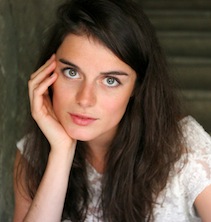
Séguillon spends her summers in France on concert tours with the San Francisco Conservatory's Aleron Trio, which will also give concerts in Spain and in various locations throughout the U.S.
Séguillon, who has studied with Axel Strauss, will receive a Master of Music from the Conservatory this month.
The violinist has performed with both the UNESCO Orchestra (as concertmaster) and the San Francisco’s Magik*Magik Orchestra.
She will play a program of Vaughan Williams, Brahms, and Fauré, with pianists Kevin Korth, Teresa Yu, Igor Pancevski, and cellist Anne Suda.
New Century, the Movie, Sizzles
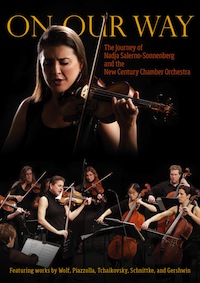
How do you do justice to the twin volcanos of Nadja Salerno-Sonnenberg and the New Century Chamber Orchestra? Just follow them with a camera and show it all. The deed is done, and the result is spectacular. On Our Way is a good title, but in need of something specific, so the self-explanatory The Journey of Nadja Salerno-Sonnenberg and the New Century Chamber Orchestra was added to the DVD soon to be published.
The work by CounterPoint Films and NSS Music is masterful every way — structure, audio and video quality, and continually engages and interests; everything is covered. The film is both a documentary of the group's recent history and footage of the ensemble's tour concert in Santa Monica. The on-the-road scenes are reminiscent of Freeway Philharmonic, former home of some NCCO players, but the vast majority of the film consists of performances.
Thoughtfully, the DVD opens with an option to view the entire film or only the concert portions. This allows to see everything on first pass, and then run the concert performances only, without the need to search for them in the body of the film.
The DVD has — to return to the volcanic simile — the dangerous beauty and exciting grandeur of Mauna Kea and Mauna Loa, except here both Mt. Nadja and Mt. Ensemble are constantly erupting; nothing is dormant here. Be sure to allow time after first viewing for a quick nap to recover from the experience. The DVD features a few scenes from rehearsals and orchestra tours, backstage moments, including what is called in the press release as "candid comments" from the musicians. I couldn't find anything salacious, alas.
Performances include Hugo Wolf’s Italian Serenade; Astor Piazzolla’s Four Seasons of Buenos Aires; Tchaikovsky’s Serenade for Strings in C Major, Op. 48, Alfred Schnittke’s Polka; and "Bess, Yo' Is My Woman Now," from Gershwin’s Porgy and Bess. It all bubbles, sizzles, bounces off the walls, and overflows the banks of the ordinary.
The DVD will go on sale May 8 from CD Baby and other outlets. Meanwhile, available now are many great New Century recordings, including the 2009 Together and the 2010 LIVE: Barber, Strauss, Mahler.
McMane's YWCP Into to the Musical Alphabet Soup
Joining SFS, SFB, SFO, SFBC, and — significantly — SFGC, there is now YWCP, the Young Women's Choral Projects of San Francisco. You know, of course, that SFGC is the San Francisco Girls Chorus, whose artistic director, Susan McMane, departed last week under controversial circumstances.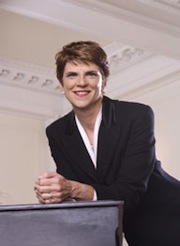
Not wasting any time, McMane is announcing the formation of a new girls' chorus, and that's what YWCP is. It's not yet quite tripping off the tongue; more a plan than an accomplished fact. As far as projects are concerned, however, this seems to have a robust promise.
Beyond the grandiose goals to be "... a testimony of women’s abilities to create a more beautiful world ... [teaching] dedication and commitment to the highest ideals of humanity," it may well provide a fine opportunity for girls who just wanna have fun, and sing.
McMane's plan is to form an auditioned choir of young women, 12 to 18, from around the Bay Area, to perform locally in 2012-2013, and travel to Italy for performances in June 2013. Tamara Hicks is chair of board, and she says of McMane: "There are few individuals in the world with her talent and track record leading young women’s choral organizations."
An informational meeting is scheduled for 4 p.m. April 15 at Synergy School, 1387 Valencia. The contact is Anne Heminger at [email protected].
Distinguished Guests for S.F. Girls Chorus Season
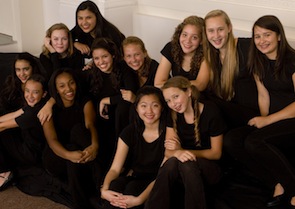 With Interim Music Director Brandon Brack taking the baton from McMane (item above) to lead the San Francisco Girls Chorus, the organization's 2012-2013 season features significant commissioned composers and guest artists.
With Interim Music Director Brandon Brack taking the baton from McMane (item above) to lead the San Francisco Girls Chorus, the organization's 2012-2013 season features significant commissioned composers and guest artists. Attractions include the premiere of an oratorio, Holy Daughters by Gabriela Lena Frank (named composer-in-residence) and Pulitzer-winner Nilo Cruz, premieres of new Christmas music by Gordon Getty and young composers, and guest artists soprano Jessica Rivera, Jeffrey Thomas and the American Bach Soloists, members of the Berkeley Symphony Orchestra, Marcus Shelby Trio, and Joana Carneiro.
The May 3 world premiere of Holy Daughters will take place in Mission Dolores, with the participation of members of the Berkeley Symphony. The work is based on Biblical texts interpreted by Portuguese poet José Tolentino de Mendonça. Nilo Cruz provided the libretto in Spanish, Portuguese, and Nahuatl (the pre-conquest language of central Mexico). The commission was made possible by the Wallace Alexander Gerbode and the William and Flora Hewlett foundations.
Born in Berkeley, to a mother of mixed Peruvian/Chinese ancestry and a father of Lithuanian/Jewish descent, Frank has long explored her multicultural heritage through her compositions. Inspired by the works and methods of Bartók and Ginastera, Frank considers herself "something of a musical anthropologist." She has traveled extensively throughout South America and her pieces reflect her studies of Latin-American folklore, incorporating poetry, mythology, and native musical styles into a Western classical framework.
Berkeley Symphony Season-Closer
Speaking of Frank's Holy Sisters (item above), Berkeley Symphony also claims a world premiere by featuring the first part of the work on the Berkeley Symphony's April 26 season-closing concert.For the rest of the program, Music Director Joana Carneiro will take up Hungarian repertory with Kodály’s Dances of Galánta and Bartók’s Music for Strings, Percussion, and Celesta.
Part two of Holy Sisters, commissioned and premiered in its entirety by the San Francisco Girls Chorus, will be performed by the Berkeley Symphony in 2013.
San Francisco Ballet's Season No. 80
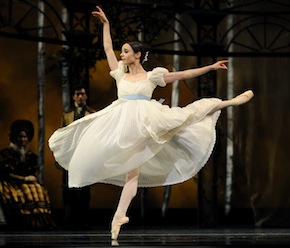 San Francisco Ballet's 2012-2013 season, announced today, offers world premieres by Wayne McGregor, Yuri Possokhov, and Alexei Ratmansky; a US premiere by Christopher Wheeldon, and the Northern California premiere of John Neumeier's Nijinsky by Neumeier's visiting Hamburg Ballet.
San Francisco Ballet's 2012-2013 season, announced today, offers world premieres by Wayne McGregor, Yuri Possokhov, and Alexei Ratmansky; a US premiere by Christopher Wheeldon, and the Northern California premiere of John Neumeier's Nijinsky by Neumeier's visiting Hamburg Ballet. As each year since 1944, the season begins with Nutcracker performances, Dec. 7-28. Opening night gala is on Jan. 24; eight programs will be given in alternating repertory, Jan 29 through May 12.
Program 1 opens with the SFB premiere of Serge Lifar's Suite en Blanc, Jerome Robbins’ In the Night, and a yet to be named new work by McGregor.
Program 2 will offer the full-length Nijinsky, a story ballet about the turbulent life of Vaslav Nijinsky. The music is by Chopin, Schumann, Rimsky-Korsakov, and Shostakovich. The company's most recent collaboration with Neumeier was the production of his The Little Mermaid, telecast nationally on PBS (and not much Hearted by some).
Program 3 will have Mark Morris’ Beaux, set to Bohuslav Martinu’s Harpsichord Concerto, the reprise of this season's Guide to Strange Places by Ashley Page, and a work yet to be named.
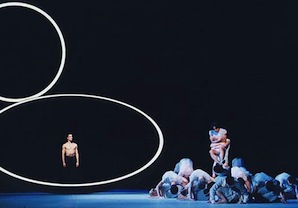
Program 4 reprises the George Balanchine/Mendelssohn Scotch Symphony (at the Opera House this week, part of an all-Balanchine program), a new work by Ratmansky (former artistic director of the Bolshoi Ballet and current artist in residence at American Ballet Theatre), and Wheeldon’s Within the Golden Hour.
Program 5 will present the return of John Cranko’s story ballet Onegin, which opened the current season.
Program 6 combines Act 3 of Rudolf Nureyev’s Raymonda, a new work by Possokhov, and Edwaard Liang’s Symphonic Dances, held over from the 2012 season.
Program 7 revives Helgi Tomasson’s 1997 Criss-Cross, Possokhov’s 2012 Francesca da Rimini, and Balanchine’s 1972 Symphony in Three Movements.
Program 8 concludes the season with Wheeldon’s Cinderella, a coproduction of SFB and the Dutch National Ballet, which presents the world premiere in Amsterdam in December.
Three-, five-, and eight-program subscription packages range in price from $67 to $775, to go on sale June 4; current subscribers can renew now.
In Memoriam Milly Rosner
Cello teacher Milly Rosner's recent death and life are the subjects of "Celebrate Milly!" at Crowden Music Center from 6 to 10 p.m. on April 21. It is a party, explains the school's Eugene Sor, because "one of Milly's final wishes was that, rather than to have a memorial service for her, she wanted her family and friends to have a party celebrating her life." The plan is for "an evening with friends, music, food, and memories of this most amazing woman, at Crowden, where Milly spent nearly three decades inspiring young musicians."Bonnie Hampton plans to rehearse and direct a mass cello choir performance at the event, encouraging guests also to form their own cello ensembles and to bring cello ensemble literature to sightread or arrange their own rehearsals.
At the Rosner family's request, donations are request in her memory to the Milly Rosner Scholarship Fund, which provides financial aid for students attending Crowden.
Make Way for Count Ory
Pocket Opera's second offering of the season is Rossini's Count Ory. It opens on April 15 at the San Francisco Marines' Memorial Theater, repeats there on April 22, and moves to Berkeley's Hillside Club on April 29.Donald Pippin, of course, is music director, pianist, narrator, etc., but the director this time is Phil Lowery. With great memories of his last Pocket/Rossini assignment, The Italian Girl in Algiers last year, Lowery says he has always been fond of the "musical energy and the quality of silliness in Rossini's comic operas."
The cast includes Darron Flagg in the title role, Jennifer Ashworth as Countess Adele, Yvette Litchfield, Jennifer Panara, Diana Kehrig, Jonathan Spencer, and Michael Mendelsohn.
Quasthoff Speaks of Career, Retirement
A must-read interview in Der Spiegel:SPIEGEL: Mr. Quasthoff, you have announced your departure from the music business. Was it because of your voice or your body?Quasthoff: It was two things. I lost my brother Michael a year and a half ago. He was my best friend and confidant. He died of lung cancer at 52, and it was a huge loss. Then I become very ill with laryngitis and an inflammation of the vocal chords. I had always told myself that I would continue working if I got well and was able to function at the same level technically as I had before. But that wasn't the case.
SPIEGEL: You were at the peak of your career.
Quasthoff: I achieved everything one can achieve as a concert singer. Six Echo Klassik (German classic music) awards and three Grammys, and I also have my professorship at the Hanns Eisler Academy of Music in Berlin. Now I'm going to turn to other things, like readings or audiobooks.
...
SPIEGEL: Is music a kind of magic?Quasthoff: I don't know. Let me tell you a story instead. I was a member of the Windsbach Boys Choir, the first ensemble to sing the complete St. Matthew Passion in Israel after World War II. A man came up to me in the intermission. He was crying. He had a blue number tattooed onto his arm (a sign that the man had been imprisoned in a Nazi concentration camp). He hugged me and said, in German: "I'm speaking German today for the first time in more than 50 years. I lost my entire family." His wife, his children, his parents, everyone. "I heard you singing today, and now I know that Germany is a different place once again." When I gave a recital in Munich two weeks later, he came to my dressing room.
A Good One for the First Day of April (or Any Time)
Leah Garchik reports in The San Francisco Chronicle:
For Sunday's concert of the San Francisco Chamber Orchestra in Berkeley, conductor Ben Simon raised his baton to begin a performance of Mendelssohn's Italian Symphony. The orchestra, reports Judy Kunofsky, began playing Beethoven's Fifth.Simon "froze, appeared startled, then dropped to the floor in hysterics." It was the musicians' April Fool's joke on the maestro.
Remember the San Francisco Symphony?
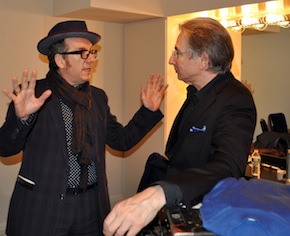
Photo by Oliver Theil
Your musical sleuth solved the puzzled and found SFS on its lengthy national tour from the following clues:
- "Tilson Thomas’s crusade on behalf of what he calls 'American mavericks' tradition is among the finest things that he or any conductor has undertaken in recent years." [Alex Ross, The New Yorker, 2/27/12]
- "For this series, part of the orchestra’s centennial celebrations, Mr. Thomas, who has been music director of the San Francisco Symphony since 1995, could have shown off his players in works by Mahler and Beethoven. Instead he adventurously explored the heritage of flinty individualism that runs through American music. The risk paid off, because the hall was packed with eager listeners." [Anthony Tommasini, New York Times, 3/29/12]
- "In the San Francisco Symphony’s four-night stand at Carnegie Hall, the centerpiece of the American Mavericks festival, the music had about as much in common with your everyday orchestral program as a dog collar has with standard concert dress. But full or nearly full houses all week demonstrated that if you program these spiky, exhilarating works with pride and play them with passion, the public will turn out ... it was hard to argue with these thought-provoking, richly entertaining shows or the commitment that the San Francisco players brought to them. [Zachary Woolfe, New York Times, 4/1/12]
- "When most orchestras go on tour, they usually bring a star soloist, along with a play-it-safe program of populist Late Romantic barn-burners, the better to ensure box office out of town. Leave it to Michael Tilson Thomas to turn that tradition on its ear ... Tilson Thomas and the San Francisco Symphony get props for sheer audacity, presenting such a bizarro piece [Ives’ Concord Symphony orchestrated by Brant] as the main work of a touring program." [Lawrence A. Johnson, Chicago Classical Review, 3/22/12]
- "In the mold of the 17 American composers featured on the tour, the Symphony’s four concerts were blisteringly unapologetic and daring ... this festival is an event of immense cultural importance to the world of American music and, more idealistically, to America at large." [Garrett Schumann, Sequenza 21]

